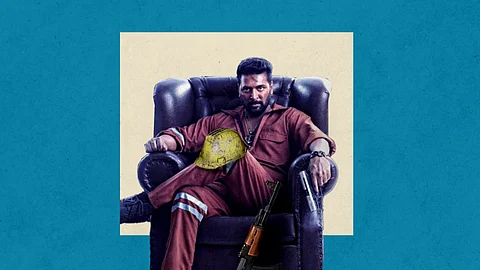
- Reviews
- Power List 2024
- Cannes 2024
- In-Depth Stories
- Web Stories
- News
- FC Lists
- Interviews
- Features
- FC SpecialsFC Specials

Director: N Kalyanakrishnan
Cast: Jayam Ravi, Priya Bhavani Shankar, Harish Uthaman
Over halfway into Agilan, Jayam Ravi is slap-bang in the middle of a battle in the deep sea. The last time we saw him in the middle of a charged oceanic battle was in Ponniyin Selvan, warding off the Pandyas in a spectacularly choreographed sequence. The action set piece in Agilan, too, is set up tenaciously – instead of Pandyas, the actor is earnestly kicking up a storm against deadly eastern sea pirates. But the only difference here is that as the scene concludes, we barely register any note or nuance, efforts of a superb action piece misspent. This seems to be the curse that closely follows Agilan throughout its course.
Jayam Ravi is Agilan, a crane operator in the Madras harbour, who plays fast and loose with rules. And at first glance, you really can't figure him out. Described by his boss Paranthaman (played by Tamil cinema’s stock villain Hareesh Peradi) as a “cunning dog”, we see Agilan smuggle drugs in freight containers as the star is introduced. And a few moments later, we see him get a rise out of a harbour officer working on his own side, whom he eventually takes down. As Paranthaman points out, Agilan is neither a loyal servant nor a good henchman. He goes by one and only philosophy in life – treachery. Righteousness and loyalty are used to enslave a person, he says. And in another line, he depicts pride in coming from a long line of fishermen. “The sea belongs to me,” he declares. But apart from a dialogue here and there about squashing social order later on in the film, these packed lines, like its utterer, are never unpacked.
Agilan is further in cahoots with sub-inspector Madhavi (Priya Bhavani Shankar), who routinely cleans up his dirt. A romance is established (with a minute-long lover’s repartee that seems out of place in the film), but never really explored with any form of depth. Agilan has one goal and that is to rise through the ranks and annihilate anyone that’s in his way. It doesn’t matter if it is a friend from the hood or a reckless boss. He wants to become the “king of the Indian ocean.” Well, who doesn’t? We see his ego and his superego. But what about his id? The emotional unpacking of criminal masterminds is often what makes films in this genre immersive. But the payoff scene here comes too little too late, and barely takes the time to convince us of its newly built world (read flashback). Apart from a few sleek action set pieces (in one such scene, the makers have rollicking fun with the idea of mannequins to smuggle a high-profile data hacker), and Jayam Ravi’s sincere act, the film leaves us no real meat to chew on.
“Data is the new oil,” we are told, as the film grapples to explain its tonal shift from focusing on drugs to human trafficking. But how much data is too much data? The film takes the first hour of the film to explain its labyrinthine milieu to us, which on paper, is not really a bad thing as not many of us in the audience are hardly familiar with the nuances of container mafia and the proportionality between sea traffic and inflation. But again, smarts without any heart can only take you so far.